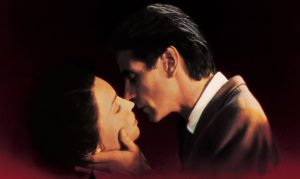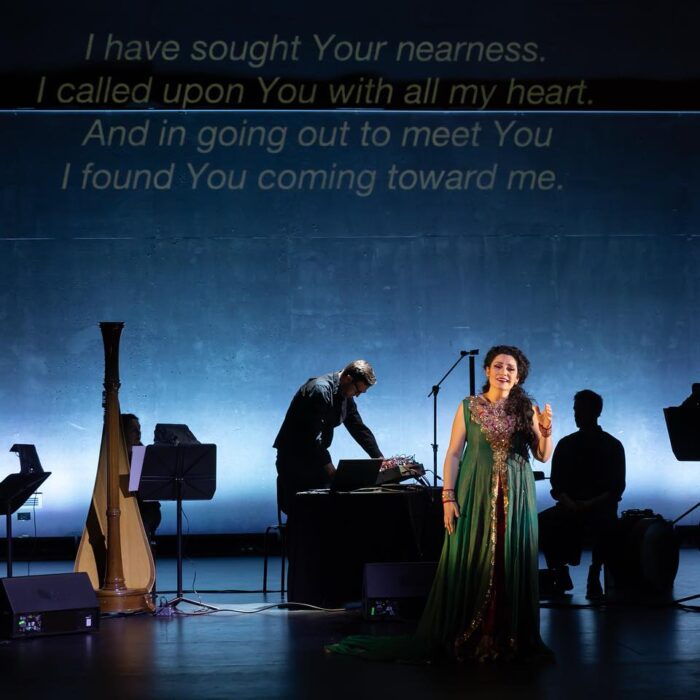
Opera Meets Film: How David Cronenberg & David Henry Hwang’s ‘M. Butterfly’ Subverts Puccini’s ‘Madama Butterfly’ & Explores Deceptive Reveries
By John VandevertWhat would you do, say, and believe for love, and most importantly, what would you ignore for the sake of love? Such standardized questions seem to permeate the fabric of the operatic world from time immemorial to the present, and the well is not showing signs of running dry anytime soon. But we must ask a second and more important question: How does one willfully neglect the truth for a momentary illusion? The answer to this has yet to be adequately fulfilled.
As Friedrich Nietzsche starkly noted in “Beyond Good and Evil” (1886), “What is done out of love always takes place beyond good and evil.” Funny enough, the Italian composer Giacomo Puccini, for whom the play and film adaptation of “Madame Butterfly” owe their artistic credit, is recorded as having been incredibly libertine with his amorous pursuits, and as the maestro put himself, “I am a mighty hunter of wild fowl, operatic librettos and attractive women.” Thus, most of the composer’s operas revolve around the tribulations induced by Cupid, her beguiling exploits, and the often unnerving consequences of the tantalizing feeling on its victims.
But in David Cronenberg’s 1993 film tersely titled “M. Butterfly”—which itself is a screen-adaptation of David Henry Hwang’s 1988 play—Nietzschean cynicism towards love’s completely sublime nature is coated around a thick gloss of romanticized surreality which is not wholly unreliable due to its appeal to standardized conceptions of Orientalism, the fanciful creations of the Far-Eastern and Asiatic worlds, and essentialist conceptions of what the people (especially women) behaved like. The film also deals heavily with the contentious topic of racial fetishism, just one sub-parameter of Orientalism, and the portentous effects of decoupling oneself from reality and rational thinking as a result.
Puccini’s 1904 three-act masterpiece “Madame Butterfly,” while forming the backbone of the narrative structure of both the play and Cronenberg’s film, is also invoked both diegetically and non-diegetically through quotations of arias and scenes, most notably that of “Un bel di vedremo” from Act two. The composer’s verismo-laden, bel canto invocations of the soul are exploited for in-scene narrative purposes as well as sub-textual narrative purposes, which highlight the similar plight of “M. Butterfly’s” protagonist, René Gallimard, and his urge to believe that his beloved Song Liling is not only a woman but in love with him through Cio-Cio San’s powerful prayers, this despite all signs pointing to deception.
Song Liling isn’t a woman but a cross-dressed man and counterintelligence agent, and the aria’s presence in the film’s trailer allude to love’s beauty and cruelty.
“Butterfly’s” Origins and Reinvention
While being the main inspirational force behind both the play and the film, Puccini’s opera situates itself within the film’s plot, making a very interesting case of meta-narrative intertextuality. In the original story, we come to find out that French diplomat René Gallimard’s favorite opera is “Madame Butterfly,” a not-so-subtle allusion to how the Western world has and still fetishizes the Asian world, skewing his ideations of the “perfect woman.”
It’s easy to chalk it up to dominant man vs. submissive woman, but the truth “Madame Butterfly” exhibits is far more multifaceted, a fact that conceivably wasn’t lost on Puccini at the time of its writing. The original story upon which the opera is based comes from the writing of John Luther Long. In 1898, he put to paper his sister’s experiences in Japan with her Methodist missionary husband during an all-together tenuous period in Japanese/American relations which grew worse during the first half of the 20th century. Long’s story, however, was inspired by an earlier work, Pierre Loti’s “Madame Chrysanthème,” published in 1887. His story was a fictional, autobiographical work recounting his experiences as a naval officer and his illicit relationship with Chrysanthème.
Loti’s work would become an instrumental force in defining European views of Japan in the early 20th century and would inspire no less than two operas (Messager, Puccini), countless stories, and expressionary reinventions throughout the ages, the most recent being Huang Ruo’s opera “M. Butterfly,” set to receive its premiere in July 2022.
In Cronenberg’s adaptation, Gallimard’s imagination runs unimpeded despite obvious signs of deceit. His rose-colored elysian fantasy is not shaken until the end of the film when following his incarceration, Song, now revealed, taunts Gallimard and pushes him to suicide. The psychologically horrific yet dramatically exceptional part is once Song leaves his cell, Gallimard dons the “Madame Butterfly” costume, takes on the persona, and commits suicide in the same way Puccini’s fated heroine does.
Thus, the opera quite literally forms the internal structure of the story and subverts the typical operatic progression for one of much more gravitas. The Western “colonizer” is destroyed as the victimized “colonized” looks dispassionately on.
Colonizing the Present, Highjacking the Future
The original trailer of Cronenberg’s film features one of the most popular arias from Puccini’s “Madame Butterfly,” “Un bel di Vedremo (One fine day we’ll see).” This is Cio-Cio San’s brutally endearing and hopeful plea for fate to smile upon her so she can reunite with Pinkerton upon his return to the shores of Nagasaki. In the end, he returns, but she is heavily mistaken in thinking it is to reunite with her in matrimonial bliss. Instead, the reality confronts her; Pinkerton has come to retrieve their child and begin life with his American wife, whose contrition for taking Cio-Cio San’s child amounts to little more than an “Oops, sorry about it.”
Halfway through the trailer, the camera pans to the Peking Opera House as Cio-Cio San’s emotional declaration begins its final ascension. The burning tension heats the water of well-intentioned yet misplaced hope. “This will all come to pass, as I tell you. Banish your idle fears, for he will return, I know it.” We are then treated to a bricolage of scenes from the movie’s first half as Song and Gallimard fall “in love” while the world around them devolves into international hostility, espionage, and widespread distrust.
Thus, with this aria, through delicate churning and pulling currents, sweeping melodicism, and bel canto fury, Cio-Cio San finally reveals to us she is well aware of her plight and yet neglects reality for the comfort of delusion if not only for a short and fleeting moment. Every aspect of the soprano voice must pull forth from ether the future in which Cio-Cio San sees herself. Through the continuous striving to make a sublime dream a reality through mental effort alone, the aria’s stalwart dramatism, lacquered with monstrous fragility, exemplifies the constitution of this young girl who by no fault of her own had her present “colonized” and her future hijacked.
As the aria’s postlude plays, the results of Gallimard’s desire for the “perfect woman,” whom Cio-Cio San embodies, are revealed. Gallimard is taken to court and found to be a traitor to the French nation, while the Cultural Revolution rages ever onwards outside the walls of the Western world.
Final Thoughts
While the pervasive appeal to stereotypical Orientalist tropes and imaginations of the mystical East are among the most potent elements within the film, “M. Butterfly” reconfigures the story of Puccini’s opera to portray instead the fallibility of not only the Western worldview but the disastrous effects of believing in a fragrant lie that says, I believe therefore it is. I love, and therefore it is. I dream, and therefore it is. The film, the opera, and indeed the aria itself play within this liminal space and are caught in the mire of deceptive reveries, where what’s on-screen is almost entirely hijacked by a desire for what should be there.
By using Puccini’s “Madame Butterfly” as one spoke of “M. Butterfly’s” conceptual core, Cronenberg’s factually extended story—a retelling of history from the Chinese-American perspective—becomes laden with the latent invocations of cultural anomie and dehumanization as if the East only gains value when narrativized. Thus, as Cio-Cio San tunefully boasts of a new and joyous life, we are reminded of how much both Song and Gallimard lost and that there truly are no real winners in the game of love.


